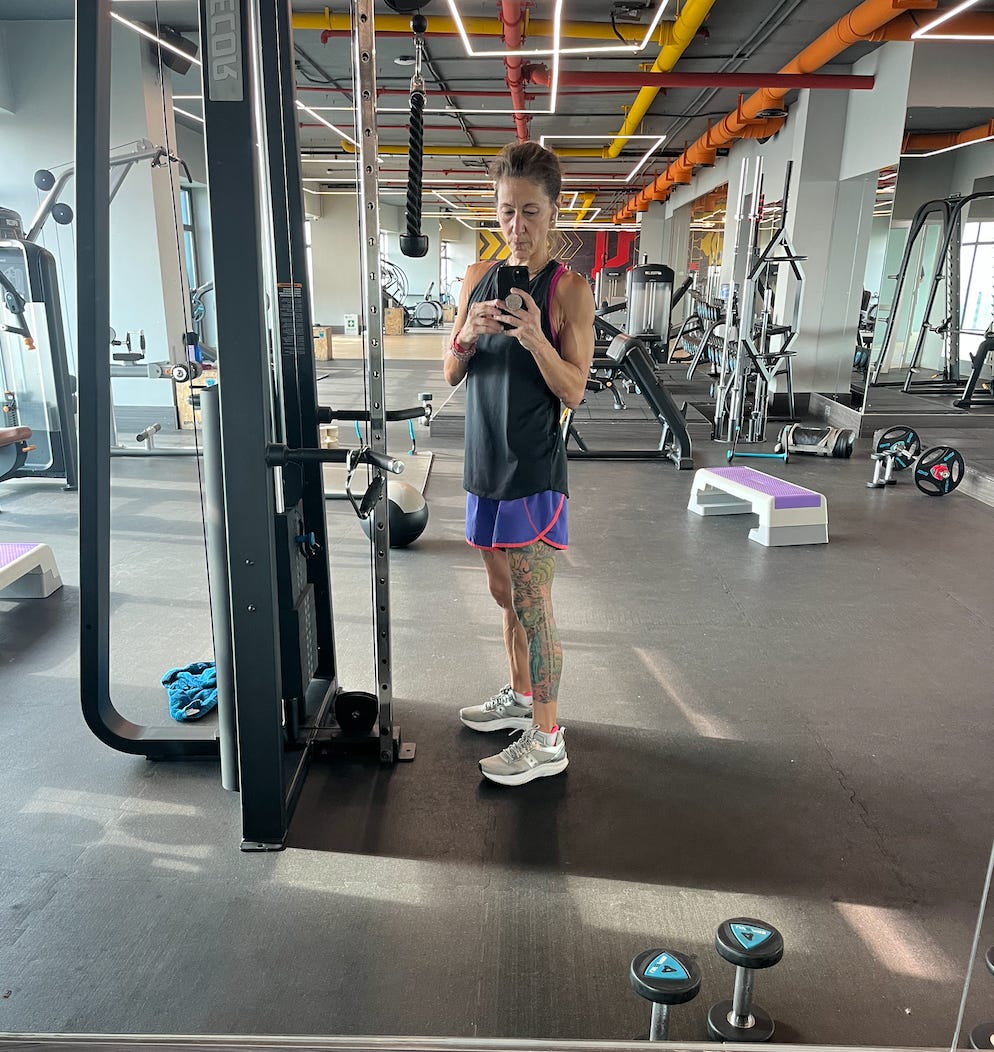Whether you listen to the VoiceOver for accessibility, because you’re more of an auditory learner or so you can grab some movement while we’re together—it will consistently be an option.

Once upon a time.
In Chapel Hill a mysterious land far, far away.
I opened a personal training studio.
One of the many benefits of ownership was my then partner & I could always find time to lift together.
This was something we enjoyed doing as it created a consistent pattern of connection.
It was also an interaction which provided me an insight into myself which still serves me 3 decades later.
But I’m getting ahead of myself.
When we trained together I served as his spotter *and* his cheerleader.
Two more! Come on! You have two more reps left in you!! I’d scream remind him.
Most of the time, in response to my encouragement, he’d squeeze out additional reps surprising even himself with his strength.
When we trained together we quickly learned I required only a spotter—-never a cheerleader.
Two more!! He’d encourage when I’d begin to falter and move to rack the weights.
I’d stop anyway.
You’ve got this! Add ten more! He’d suggest as I slid plates on a bar and got ready to bench press.
I’d ignore him & lift the weight *I* had planned.
When cheered on I tended to stop sooner than I otherwise might.
When ‘cheered on’ my immediate thought still typically is:
I know myself, I know what I can do, I’ll stop when *I* know I’ve hit my limit.
Not my partner
When he was on the receiving end of encouraging words he was motivated to do more than he’d thought he could.
personal trainer Carla selling sessions for valentine’s day
It was during these training sessions it began to dawn on me how unique each person’s Language of Encouragement is.
More than the philosophy of ‘an encouraging word spoken at the right time can make all the difference’ I realized the type of words matter and what makes one human respond/work harder really can make another think:
Nah, Im done.
Around this same time a friend whose goal was weight-loss asked if I’d be her accountability partner.
We texted daily. I asked how she was fitting workouts into her day. I enquired what they were and about the duration. We brainstormed her eating plan. I’d make suggestions where it looked to me as though she needed help.
Our calls soon tapered to weekly and then grew less frequent than that.
When I reached out and asked what happened she explained my “nagging” made her feel pressured.
She shared she felt like a failure if she didn’t measure up to what she thought I expected of her.
Cue life-insight moment part two.
I had been careful not to metaphorically shout two more reps!! (I knew how little that motivated me) and as a result I fell back on my Language of Encouragement.
A language of encouragement which wasn’t hers.
Picking up heavy things & putting them back down in Nairobi, Kenya
The experience with my friend reinforced how vastly different all of our Languages of Encouragement are.
📌 I do not respond well to “cheering-on” as I believe I intuitively know my limitations better than others.
📌 I do respond well to “check-ins” about my goals. I perceive these check-ins not as nagging, but as indication the other person has heard me and is invested in my success.
I feel as though I have a teammate.
I like this.
📌 Learning someone’s Language of Encouragement allows me to move from intention (wanting to help) to concrete action (speaking their language) and to fully showing up as the ‘scaffolding in human form’ I aspire to be.
I began asking everyone (loved ones to coaching clients) to explain their Language of Encouragement.
I grew curious and listened to how THEY needed and wanted to receive support.
Decades later I think about all of this frequently.
The interactions taught me the importance of defining what I require to feel encouraged (check-in with me. offer gentle reminders you remember my goals, too).
They showed me encouraging others first demands I pause, ask what’s important to them, and learn how they best receive encouragement to feel supported as they gain momentum toward goals.
We humans are complicated, huh?
Amazing, beautiful and complicated.
Now you.
Have you spent time defining your Language of Encouragement? Have you shared it with others?
What well-intended words can cause you to feel discouraged?





I have NOT figured out what my LoE is. After more than 7 decades wandering around this life, you'd think I'd have wanted to know that by now. My gut tells me I know myself and don't need encouragement, but I know that's not true. I like encouragement that doesn't feel like judgment. And I know who gives that to me, often unsolicited.
I love this. It’s always frustrated me when I need something or when I try to encourage someone and it falls apart. And I’ve never really put together why.